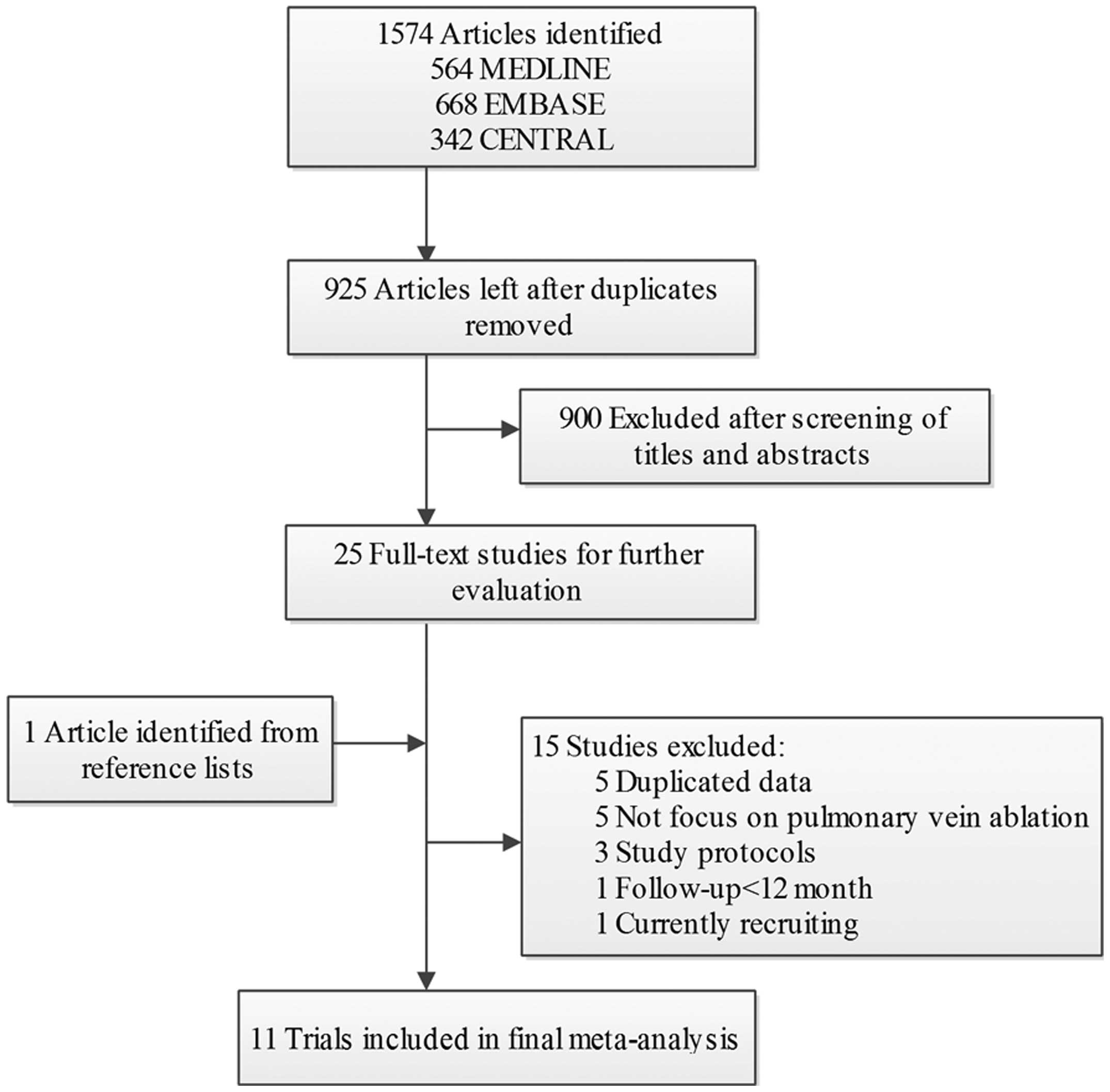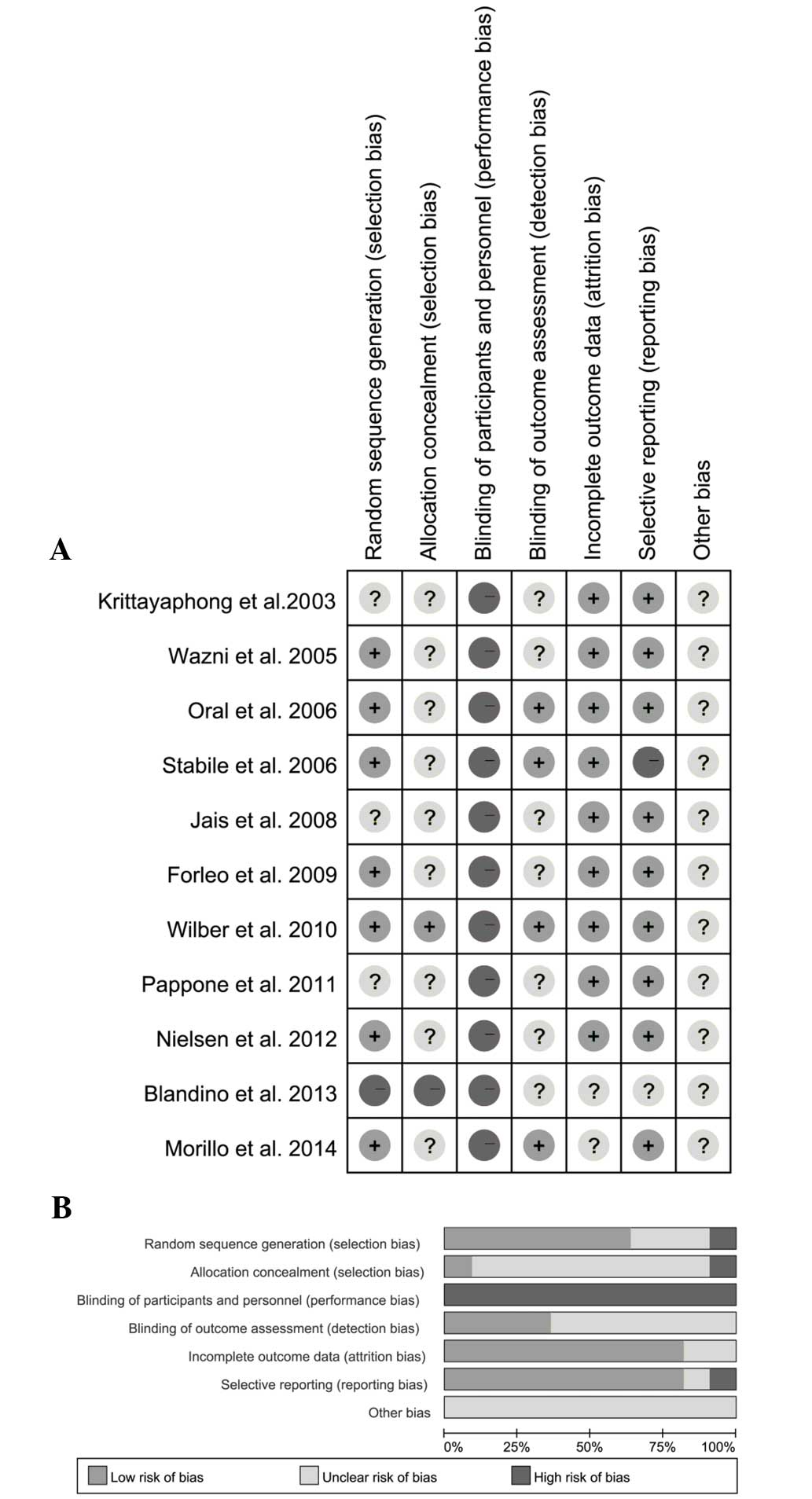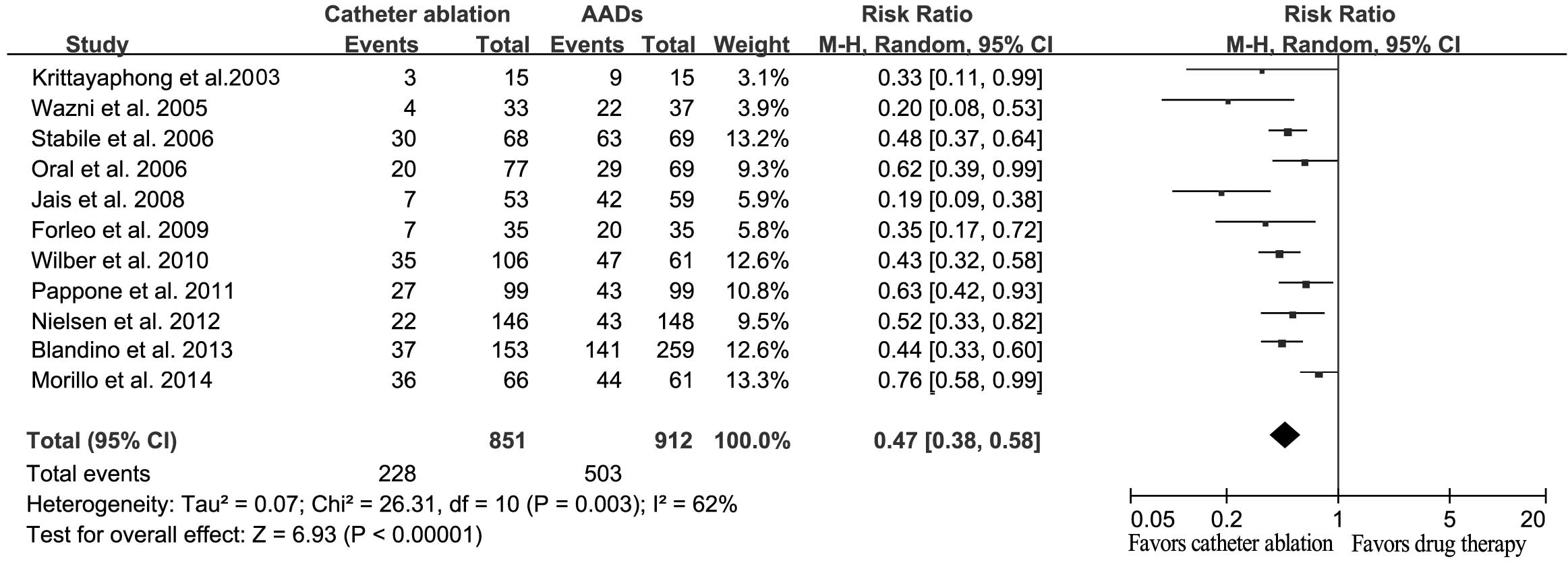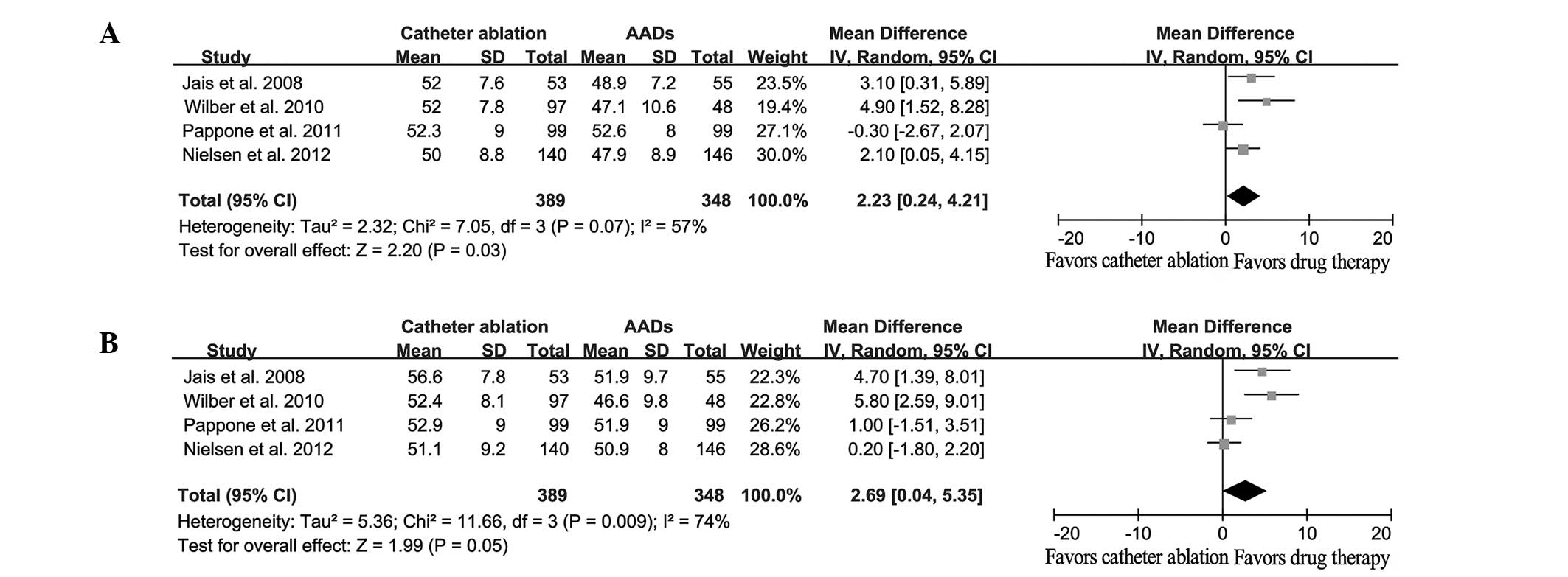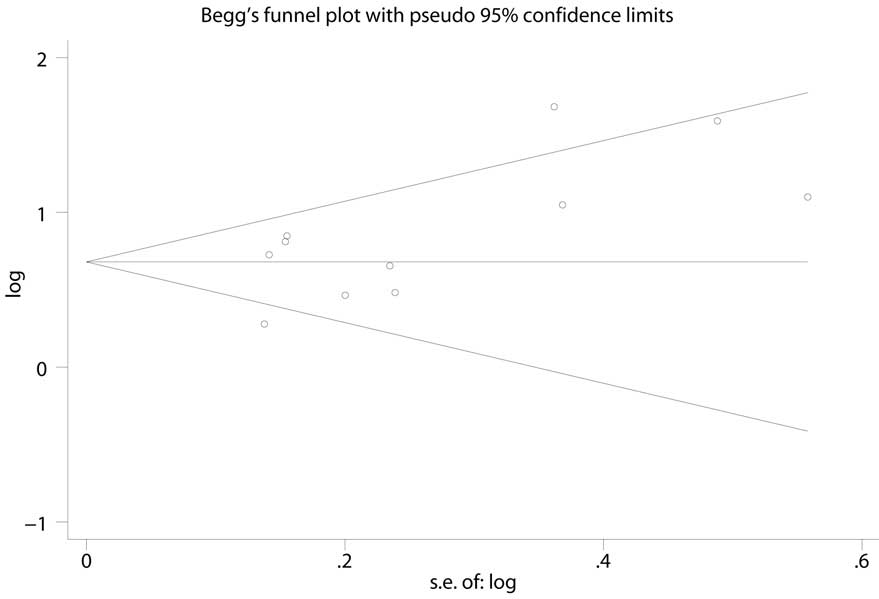|
1
|
Naccarelli GV, Varker H, Lin J and
Schulman KL: Increasing prevalence of atrial fibrillation and
flutter in the United States. Am J Cardiol. 104:1534–1539. 2009.
View Article : Google Scholar : PubMed/NCBI
|
|
2
|
Wilke T, Groth A, Mueller S, et al:
Incidence and prevalence of atrial fibrillation: An analysis based
on 8.3 million patients. Europace. 15:486–493. 2013. View Article : Google Scholar : PubMed/NCBI
|
|
3
|
Zhou ZQ and Hu DY: An epidemiological
study on the prevalence of atrial fibrillation in the Chinese
population of mainland China. J Epidemiol. 18:209–216. 2008.
View Article : Google Scholar : PubMed/NCBI
|
|
4
|
Piccini JP, Hammill BG, Sinner MF, et al:
Incidence and prevalence of atrial fibrillation and associated
mortality among Medicare beneficiaries, 1993–2007. Circ Cardiovasc
Qual Outcomes. 5:85–93. 2012. View Article : Google Scholar : PubMed/NCBI
|
|
5
|
Camm AJ, Lip GY, De Caterina R, et al: ESC
Committee for Practice Guidelines (CPG): 2012 focused update of the
ESC Guidelines for the management of atrial fibrillation: An update
of the 2010 ESC Guidelines for the management of atrial
fibrillation. Developed with the special contribution of the
European Heart Rhythm Association. Eur Heart J. 33:2719–2747. 2012.
View Article : Google Scholar : PubMed/NCBI
|
|
6
|
Wann LS, Curtis AB, January CT, et al:
2006 Writing Committee Members; ACCF/AHA Task Force Members: 2011
ACCF/AHA/HRS focused update on the management of patients with
atrial fibrillation (updating the 2006 guideline): A report of the
American College of Cardiology Foundation/American Heart
Association Task Force on Practice Guidelines. Circulation.
123:104–123. 2011.PubMed/NCBI
|
|
7
|
Benjamin EJ, Wolf PA, D'Agostino RB,
Silbershatz H, Kannel WB and Levy D: Impact of atrial fibrillation
on the risk of death: The Framingham Heart Study. Circulation.
98:946–952. 1998. View Article : Google Scholar : PubMed/NCBI
|
|
8
|
Verma A, Macle L, Cox J and Skanes ACCCS
Atrial Fibrillation Guidelines Committee: Canadian Cardiovascular
Society atrial fibrillation guidelines 2010: Catheter ablation for
atrial fibrillation/atrial flutter. Can J Cardiol. 27:60–66. 2011.
View Article : Google Scholar : PubMed/NCBI
|
|
9
|
Krittayaphong R, Raungrattanaamporn O,
Bhuripanyo K, et al: A randomized clinical trial of the efficacy of
radiofrequency catheter ablation and amiodarone in the treatment of
symptomatic atrial fibrillation. J Med Assoc Thai. 86 (Suppl
1):8–16. 2003.PubMed/NCBI
|
|
10
|
Wazni OM, Marrouche NF, Martin DO, et al:
Radiofrequency ablation vs. antiarrhythmic drugs as first-line
treatment of symptomatic atrial fibrillation: A randomized trial.
JAMA. 293:2634–2640. 2005. View Article : Google Scholar : PubMed/NCBI
|
|
11
|
Oral H, Pappone C, Chugh A, et al:
Circumferential pulmonary-vein ablation for chronic atrial
fibrillation. N Engl J Med. 354:934–941. 2006. View Article : Google Scholar : PubMed/NCBI
|
|
12
|
Stabile G, Bertaglia E, Senatore G, et al:
Catheter ablation treatment in patients with drug-refractory atrial
fibrillation: A prospective, multi-centre, randomized, controlled
study (Catheter Ablation For The Cure Of Atrial Fibrillation
Study). Eur Heart J. 27:216–221. 2006. View Article : Google Scholar : PubMed/NCBI
|
|
13
|
Jais P, Cauchemez B, Macle L, et al:
Catheter ablation versus antiarrhythmic drugs for atrial
fibrillation: Rhe A4 study. Circulation. 118:2498–2505. 2008.
View Article : Google Scholar : PubMed/NCBI
|
|
14
|
Forleo GB, Mantica M, De Luca L, et al:
Catheter ablation of atrial fibrillation in patients with diabetes
mellitus type 2: Results from a randomized study comparing
pulmonary vein isolation versus antiarrhythmic drug therapy. J
Cardiovasc Electrophysiol. 20:22–28. 2009. View Article : Google Scholar : PubMed/NCBI
|
|
15
|
Wilber DJ, Pappone C, Neuzil P, et al:
Comparison of antiarrhythmic drug therapy and radiofrequency
catheter ablation in patients with paroxysmal atrial fibrillation:
A randomized controlled trial. JAMA. 303:333–340. 2010. View Article : Google Scholar : PubMed/NCBI
|
|
16
|
Pappone C, Vicedomini G, Augello G, et al:
Radiofrequency catheter ablation and antiarrhythmic drug therapy: A
prospective, randomized, 4-year follow-up trial: The APAF study.
Circ Arrhythm Electrophysiol. 4:808–814. 2011. View Article : Google Scholar : PubMed/NCBI
|
|
17
|
Morillo CA, Verma A, Connolly SJ, Kuck KH,
Nair GM, Champagne J, Sterns LD, Beresh H, Healey JS and Natale
ARAAFT-2 Investigators: Radiofrequency ablation vs antiarrhythmic
drugs as first-line treatment of symptomatic atrial fibrillation
(RAAFT 2): A randomized trial. JAMA. 311:692–700. 2014. View Article : Google Scholar : PubMed/NCBI
|
|
18
|
Cosedis Nielsen J, Johannessen A,
Raatikainen P, et al: Radiofrequency ablation as initial therapy in
paroxysmal atrial fibrillation. N Engl J Med. 367:1587–1595. 2012.
View Article : Google Scholar : PubMed/NCBI
|
|
19
|
Blandino A, Toso E, Scaglione M, et al:
Long-term efficacy and safety of two different rhythm control
strategies in elderly patients with symptomatic persistent atrial
fibrillation. J Cardiovasc Electrophysiol. 24:731–738. 2013.
View Article : Google Scholar : PubMed/NCBI
|
|
20
|
Higgins JPT and Green S: Cochrane Handbook
for Systematic Reviews of Interventions Version 5.1.0. updated.
March. 2011The Cochrane Collaboration. 2011, Available from.
https://www.cochrane-handbook.org
|
|
21
|
Guyatt GH, Oxman AD, Vist GE, et al GRADE
Working Group: GRADE: An emerging consensus on rating quality of
evidence and strength of recommendations. BMJ. 336:924–926. 2008.
View Article : Google Scholar : PubMed/NCBI
|
|
22
|
Ionescu-Ittu R, Abrahamowicz M,
Jackevicius CA, et al: Comparative effectiveness of rhythm control
vs rate control drug treatment effect on mortality in patients with
atrial fibrillation. Arch Intern Med. 172:997–1004. 2012.
View Article : Google Scholar : PubMed/NCBI
|
|
23
|
Tsadok MA, Jackevicius CA, Essebag V, et
al: Rhythm versus rate control therapy and subsequent stroke or
transient ischemic attack in patients with atrial fibrillation.
Circulation. 126:2680–2687. 2012. View Article : Google Scholar : PubMed/NCBI
|
|
24
|
Pappone C, Rosanio S, Augello G, et al:
Mortality, morbidity and quality of life after circumferential
pulmonary vein ablation for atrial fibrillation: Outcomes from a
controlled nonrandomized long-term study. J Am Coll Cardiol.
42:185–197. 2003. View Article : Google Scholar : PubMed/NCBI
|
|
25
|
Khaykin Y, Wang X, Natale A, et al: Cost
comparison of ablation versus antiarrhythmic drugs as first-line
therapy for atrial fibrillation: An economic evaluation of the
RAAFT pilot study. J Cardiovasc Electrophysiol. 20:7–12. 2009.
View Article : Google Scholar : PubMed/NCBI
|
|
26
|
McKenna C, Palmer S, Rodgers M, et al:
Cost-effectiveness of radiofrequency catheter ablation for the
treatment of atrial fibrillation in the United Kingdom. Heart.
95:542–549. 2009. View Article : Google Scholar : PubMed/NCBI
|
|
27
|
Reynolds MR, Zimetbaum P, Josephson ME,
Ellis E, Danilov T and Cohen DJ: Cost-effectiveness of
radiofrequency catheter ablation compared with antiarrhythmic drug
therapy for paroxysmal atrial fibrillation. Circ Arrhythm
Electrophysiol. 2:362–369. 2009. View Article : Google Scholar : PubMed/NCBI
|
|
28
|
Noro M, Kujime S, Ito N, et al: Cost
effectiveness of radiofrequency catheter ablation vs. medical
treatment for atrial fibrillation in Japan. Cost performance for
atrial fibrillation. Circ J. 75:1860–1866. 2011. View Article : Google Scholar : PubMed/NCBI
|
|
29
|
Noheria A, Kumar A, Wylie JV Jr and
Josephson ME: Catheter ablation vs. antiarrhythmic drug therapy for
atrial fibrillation: A systematic review. Arch Intern Med.
168:581–586. 2008. View Article : Google Scholar : PubMed/NCBI
|
|
30
|
Piccini JP, Lopes RD, Kong MH, Hasselblad
V, Jackson K and Al-Khatib SM: Pulmonary vein isolation for the
maintenance of sinus rhythm in patients with atrial fibrillation: A
meta-analysis of randomized, controlled trials. Circ Arrhythm
Electrophysiol. 2:626–633. 2009. View Article : Google Scholar : PubMed/NCBI
|
|
31
|
Bonanno C, Paccanaro M, La Vecchia L,
Ometto R and Fontanelli A: Efficacy and safety of catheter ablation
versus antiarrhythmic drugs for atrial fibrillation: A
meta-analysis of randomized trials. J Cardiovasc Med (Hagerstown).
11:408–418. 2010. View Article : Google Scholar : PubMed/NCBI
|















